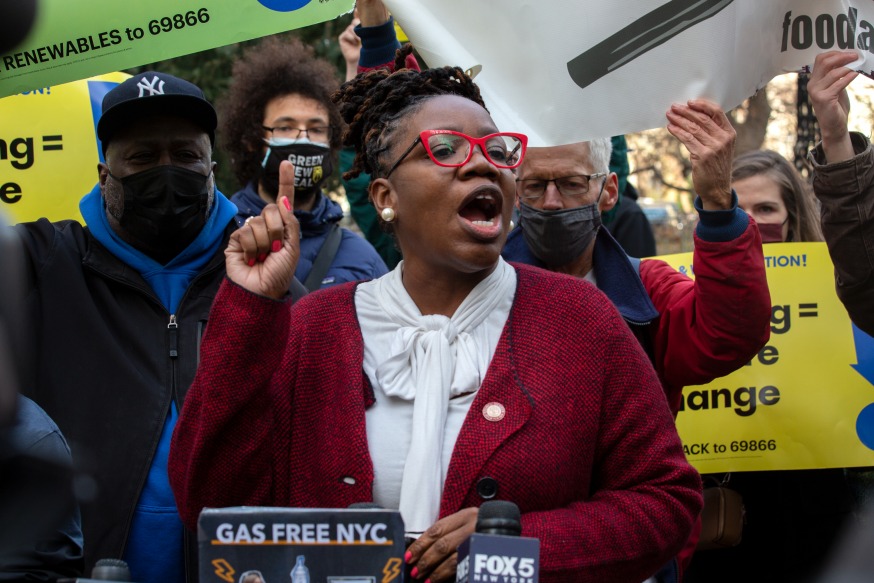
Councilmember Alicka Ampry-Samuel (D-Brooklyn) speaks at a City Hall rally ahead of a Council vote on banning natural gas in new buildings, Dec. 15, 2021.

This article was originally published by The CITY on Dec.15
By Samantha Maldonado
The City Council on Wednesday passed a bill making New York the largest city in the United States to effectively ban the use of gas in new buildings and to turn to electricity for power.
More than 50 municipalities in California have all-electric building codes, and other cities, including Seattle and Ithaca, are advancing electrification in new buildings. But no other American city has a dense building stock like New York, which faces colder seasonal temperatures compared to most places that have adopted similar legislation.
The New York bill, which establishes a threshold for how much carbon a building can emit, limiting the use of gas, could set an example for the rest of the country, environmental advocates said.
“To think that every new iconic skyscraper on the New York City skyline will soon be built without any fossil fuel use — I think it’s a game-changing moment for the climate movement,” said Jenna Tatum, director of the Building Electrification Institute.
Mayor Bill Blasio is expected to sign the bill or let it lapse into law.
Here’s what you need to know:
What’s the point of prohibiting gas in new buildings?
Buildings are responsible for about 70% of the city’s greenhouse gas emissions, which warm the planet and threaten health.
“Furnaces, boilers and hot water heaters emit more carbon in New York City than all uses of electricity combined today, so electrifying those systems becomes our biggest way to fight climate change,” said John Mandyck, CEO of the Urban Green Council.
This measure has the potential to save about 2.1 million tons of carbon emissions by 2040, according to an estimate by the Rocky Mountain Institute. That’s equal to taking nearly half a million cars off the road.
“New Yorkers will look back years from now and say that it had a major positive impact on public health,” said LJ Portis, environmental policy and advocacy coordinator at WE ACT for Environmental Justice.
I’m planning to move to a newly built place soon. Does this mean my building won’t have gas?
Nope — the ban doesn’t take effect right away. The ban would apply to new buildings with fewer than seven stories by 2024. That extends to July 2027 for buildings with seven or more stories.
Any gut renovation that requires a new building permit would also be subject to the law. Affordable housing would be subject to the ban in 2026 and 2028, depending on whether they’re below or above seven stories.

Not every building makes the grade when it comes to energy efficiency. Ben Fractenberg/THE CITY
Dozens of all-electric buildings are already in the works around the city, providing models for future developments.
How will this affect my current apartment?
New York City is aiming to reduce carbon from existing buildings through Local Law 97, which requires owners to meet certain emissions limits starting in 2024.
Based on how quickly the state can green the grid, most building owners, especially in the commercial sector, won’t have to do much to comply. But retrofits to electrify will help other buildings meet those targets.
This policy, as well as the looming gas ban, will help to “prove the market for energy efficient and electric building technologies and develop the workforce that is needed to install and service them,” according to Amy Turner, a senior fellow at the Sabin Center for Climate Change Law at Columbia Law School.
That means building owners are likely over time to find more — and more affordable — electrical options for appliances if they want to upgrade their heating systems.
So in the future, new buildings won’t have gas stoves?
That’s right (as long as the law isn’t repealed). Buildings won’t be able to use any fossil fuel-powered appliances, like gas boilers and stoves. Instead, they’ll incorporate electric or induction stoves and incorporate heat pumps that move cold or warm air into a home.
These swaps will make residents more comfortable and healthier, according to Russell Unger, a principal and co-leader of the Building Electrification Initiative at the Rocky Mountain Institute.
“The stuff coming off of these open flames is not all that different from having a car idling in your kitchen,” Unger said. “Over time, there’ll be notable improvements in air quality. There’ll be less ozone. There’ll be lower levels of particulate matter, which will reduce cardiovascular disease, respiratory disease, asthma, premature mortality.”
How much will this cost me? How much will it cost my landlord?
Studies have predicted lower utility bills as a result of all-electric development — but it’s unclear what the effect would be on bills for those living in multi-family housing in New York City, which sees higher than average electricity costs.
Even with increased electric use, the average New Yorker is bound to save money on paying for new fossil fuel infrastructure like pipelines.
Some studies have shown it’s less expensive for developers to build efficient, all-electric homes than it is to build using fossil fuels, and that electric space and water heating and air conditioning results in lower costs to owners over the lifetime of the appliances.
“These policies are hugely important because they save us future costs so we don’t have to go back and fix the buildings in the future,” Samantha Wilt, a senior policy analyst focused on clean energy at the Natural Resources Defense Council.
Who backed the new measure?
Local environmental and climate justice advocates pushed the measure, saying it would tamp down on the carbon released into the atmosphere, leading to a healthier planet — and healthier neighborhoods. Con Ed, the utility supplying electricity and some gas to city dwellers, also backed the bill, as did businesses that help to reduce the carbon footprint of buildings.

Environmental activists held a “die-in” outside City Hall to advocate for passage of a bill banning the use of fracked gas in new developments, Sept. 23, 2021. Ben Fractenberg/THE CITY
Supporters pointed to climate science that shows the need to eliminate dependence on fossil fuels to prevent further damage to the earth. They’re looking to pass a bill in Albany that would make New York the first state in the nation to mandate all-electric buildings.
Who opposed it?
Some big players in the real estate industry and National Grid — which provides gas to many New Yorkers — lobbied against the timeline. They warned power might not be reliable in the winter, when heat is needed, and argued it would be difficult for developers to construct large, all-electric buildings. Those interests ultimately won a longer timeline for the ban to take effect, foiling ban supporters who wanted the no-gas rule in place by 2023.
Can New York’s grid handle this change?
While Con Ed says it doesn’t expect blackouts, New Yorkers have lived through past power outages, which could take a bigger toll on people in all-electric buildings. Still, a report by the Urban Green Council found the city electric grid won’t need upgrades to handle the increased reliance on it until after 2035, when, the organization predicts, more than a third of all the building stock citywide is expected to have been electrified.
THE CITY is an independent, nonprofit news outlet dedicated to hard-hitting reporting that serves the people of New York.






